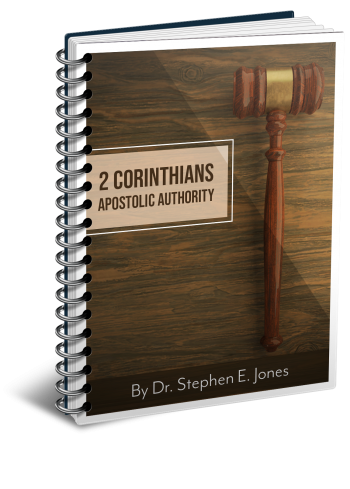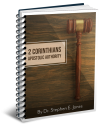Latest Posts
View the latest posts in an easy-to-read list format, with filtering options.

An in-depth commentary/study on the second book of Corinthians
Category - Bible Commentaries

2 Corinthians 13:1 says,
1 This is the third time I am coming to you. Every fact [rhema, “word, that which is spoken”] is to be confirmed by the testimony of two or three witnesses.
Paul said the same earlier in 2 Cor. 12:14, but there he did not back up his statement with a quotation from the law. Now, however, he emphasizes the truth in his letters by quoting the latter portion of Deut. 19:15,
15 A single witness shall not rise up against a man on account of any iniquity or any sin which he has committed; on the evidence of two or three witnesses a matter shall be confirmed.
Paul cited the law, as he often did, showing its authority in his life and in the life of the church. His letters were “witnesses” but in the overall sense, Paul was in the position of a judge in regard to the Corinthian church itself.
Earlier, Paul had required the Corinthian elders to judge the case of incest and also the case of the false apostles who were presenting their fleshly credentials as authoritative insofar as divine government was concerned. Those elders could be considered to be judges of a lower court, where most cases should be decided, unless the case was too difficult for them. Deut. 17:8 says,
8 If any case is too difficult for you to decide, between one kind of homicide or another, between one kind of lawsuit or another, and between one kind of assault or another, being cases of dispute in your courts, then you shall arise and go up to the place which the Lord your God chooses.
The elders had rendered their verdicts after Paul’s admonishment in 1 Cor. 6:2. Paul’s second epistle was essentially an appeals court confirmation of their earlier verdict, made necessary when the guilty parties refused to comply with the verdict of the elders. Worse yet, some of them had rejected Paul’s calling as a judge and had instead appealed to those “apostles” who might agree with their own view. Yet those “apostles” were unlawfully judging outside of their jurisdiction.
For this reason Paul found it necessary to present his credentials, first as the apostle who had established the church in Corinth, and secondly with the signs and miracles that had accompanied his ministry. Along with these credentials, he had shown his integrity by the sufferings that he had endured as an apostle—proving that he was not in this for the money or for personal benefit.
By citing Deut. 19:15, the law of witnesses, Paul implied that, as a biblical judge, he had thoroughly and properly investigated the charges, according to the instructions in Deut. 19:18, 19,
18 The judges shall investigate thoroughly; and if the witness is a false witness and he has accused his brother falsely, 19 then you shall do to him just as he had intended to do to his brother. Thus you shall purge the evil from among you.
As a good judge, Paul had sought the mind of Christ and had learned the truth of the matter. Hence, his judgment—and his letter in general—was written by inspiration. His judgment was Christ’s judgment.
We should understand that there is a lawful procedure that ought to be followed. Believers today often rely on inspiration to inform them of the truth of a matter and so they pass judgments without first investigating the charges. While this may sound spiritual, its root is often spiritual pride as a result of not studying the law.
There are cases when circumstances make such verdicts necessary, such as the case of Ananias and Sapphira (Acts 5), but this is unusual. If at all possible, biblical protocol should be maintained. Biblical protocol requires the judge to hear the evidence from the witnesses. He should not bypass this process by going directly to God for a final verdict. Going to God is normally for confirmation after the thorough investigation is complete.
Inspiration and revelation should not be used as an excuse to avoid work or to save time. The normal procedure is to complete the investigation, hear all the evidence from the witnesses, and then pray (appeal) to God in case the judge has been misled or has missed something relevant to the case.
Of course, since most of us are in no position to judge a case formally, we should recognize that our partial understanding in most cases can be faulty. While we may have opinions about disputes going on around us, we ought to be careful about giving too much weight to those opinions, lest we seat ourselves on the judge’s bench and thereby take upon ourselves the responsibilities (and accountability) of biblical judges.
In essence, Paul was telling them that his judgment was final and that if they did not comply with the divine verdict, judgment would come upon them for contempt of court. The law speaks of such cases in Deut. 17:12,
12 The man who acts presumptuously by not listening to the priest who stands there to serve the Lord your God, nor to the judge, that man shall die; thus you shall purge the evil from Israel.
The threat of death for not complying with the judge’s verdict was usually sufficient to enforce compliance, at least where individual cases were concerned. When Israel as a nation violated the law, God put the nation to death by destroying Samaria, sending the people into captivity to Assyria. The nation died because of their contempt of court, refusing to comply with the verdict rendered by the prophets.
Jerusalem too came under the same verdict more than once. The mercy of God has raised the city from the dead many times, as it were, but in the end it too will suffer death and destruction unless the entire city repents of its rebellion against God and His Christ (Jer. 19:10, 11).
Biblical judges were supposed to render verdicts as the law requires and also by the mind of God (or of Christ). Thus, the priest or judge was required to know not only the law but the Lawgiver Himself and His intent. Only then could he render a verdict that was perfectly balanced.
The judgment had to fit the crime precisely—no more, no less. As for mercy, this was the right of the victim, not the judge. The victim always retained the right to forgive.
It is apparent that Paul was not “coming” to Corinth in person but was coming by means of his letter. Apparently, this was his third letter, and Paul chose not to include his first letter in the canon. (See Lessons from Church History, Vol. 1, chapter 24.)
Paul continues in 2 Corinthians 13:2,
2 I have previously said when present the second time, and though now absent I say in advance to those who have sinned in the past and to all the rest as well, that if I come again, I will not spare anyone…
Paul was using legal terminology here. When he says, “when present the second time,” he did not mean that he was in Corinth at the time of the second witness (i.e., letter). Thayer’s Lexicon tells us that it means present “before one (a judge).” In other words, Paul was using courtroom language to convey the fact that his previous epistle (1 Corinthians) joined him with the elders in starting this court case.
The wording is not crystal clear, but since Paul’s first letter had urged the elders to set up the court and to judge the internal dispute, Paul himself was the one present before the judge(s). Paul’s legal appearance was not yet in his capacity as a judge. It was only later, after the guilty parties had rejected the lawful verdict of the elders, that Paul was required to hear the appeal of the elders to the higher court.
Paul answered this appeal in this epistle (2 Corinthians), confirming the lower court verdicts, while at the same time defending his right as apostle and judge in this case. Having made his decision, all that remained was for the guilty parties to repent and to comply with the ruling. To refuse would be contempt of court. So Paul says, “if I come again, I will not spare anyone.” Paul would not have been able to condemn anyone to death, of course. Rather, his judgment would have been to exile the lawless ones (“excommunication”).
Such a modification from death to exile was seen in various cases in the Scriptures, beginning with Cain (Gen. 4:12, 14). Israel was also sent into exile, which was the equivalent of a national death penalty.
There is a final appeal that men are allowed to make when they believe that they have been judged unjustly. It is the heavenly court. If the condemned ones believe that the judges who pronounced them guilty on earth have acted without inspiration from the Holy Spirit, they may appeal to God Himself.
In 2 Corinthians 13:3 Paul says,
3 since you who are seeking for proof of the Christ who speaks in me, and who is not weak toward you, but mighty in you.
In other words, those who had been pronounced guilty had rejected the verdict of the elders and had also questioned Paul’s confirmation of their verdict. They sought “proof of the Christ who speaks in me,” because they doubted Paul’s inspiration and did not believe that he had the mind of Christ.
For this reason, Paul felt it necessary to defend his right to judge the Corinthian church, his position as apostle and appeals court judge, and his inspiration by the mind of Christ. This case, then, provides us with internal evidence that Paul’s letters were written by inspiration of the Holy Spirit.
The legal dispute in the Corinthian church, then, established the foundation for a greater truth—that the New Testament is inspired along with the law and the prophets.
I find it interesting that even small issues have a way of working toward higher purposes.